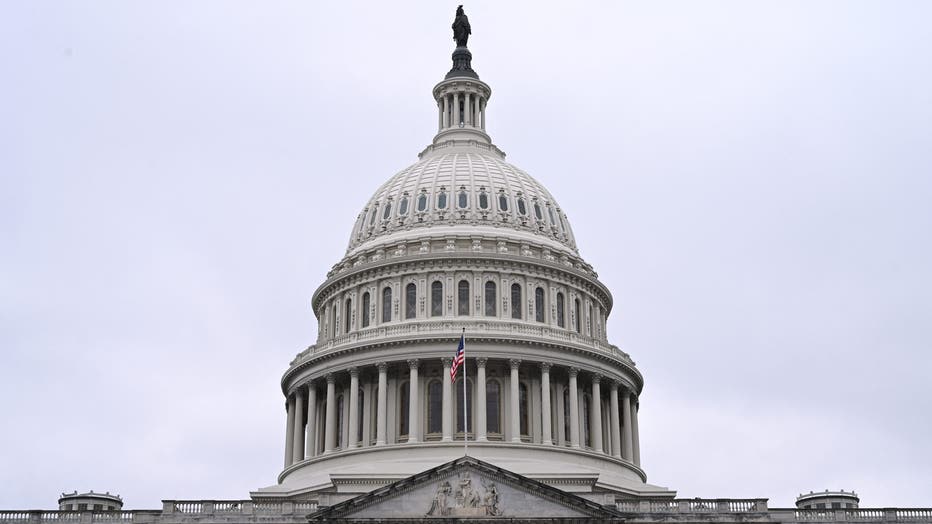'Big, beautiful' bill update: Senate debate begins after 16-hour reading

Senate advances Trump's 'Big, Beautiful Bill' to debate
Senate Republicans advanced President Donald Trump's "Big, Beautiful Bill." UCF Professor Dr. Larry Walker joined LiveNOW from FOX to talk about the latest.
The Senate advanced President Donald Trump’s "big, beautiful" budget bill of tax breaks and Medicaid cuts overnight after hours of standstill and negotiations with holdout Republican senators.
The key procedural vote passed 51-49, with two Republicans – Sens. Thom Tillis and Rand Paul – joining all 47 Democrats to vote against it. Vice President JD Vance was on standby in case he needed to break a 50-50 tie.
Changes made to the bill would add an estimated $3.3 trillion to the federal deficit from 2025 - 2034, nearly $1 trillion more than the version passed by the House.

A view of the US Capitol building on June 27, 2025, in Washington, DC. (Photo by ALEX WROBLEWSKI/AFP via Getty Images)
There’s more weekend work ahead as Congress tries to get the bill to Trump’s desk by his July 4 deadline.
"Big, beautiful bill" latest
9:45 p.m. EDT - Overnight voting postponed until early Monday morning.
3:45 p.m. EDT - Debate began in the Senate Sunday after clerks spent 16 hours reading the 940-page bill.
For context:
Democrats are using the tools at their disposal to delay and drag out the process ahead of Trump's Fourth of July deadline.
What's next:
At least 10 hours of speeches are expected to stretch into late into the night.
If they are able to pass it in the days ahead, the bill would return to the House for a final round of votes before it could reach the White House.
With the narrow Republican majorities in the House and Senate, leaders need almost every lawmaker on board.
What’s in the ‘big, beautiful’ budget bill?
Big picture view:
The legislation would make permanent many of the tax breaks from Trump's first term that would otherwise expire by year's end if Congress fails to act, resulting in a potential tax increase on Americans. The bill would add new breaks, including no taxes on tips, and commit $350 billion to national security, including for Trump's mass deportation agenda.
RELATED: Here's what's in and out of Trump's spending bill as Senate works to meet July 4 deadline
Republicans suffered a series of setbacks after several proposals, including shifting food stamp costs from the federal government to the states or gutting the funding structure of the Consumer Financial Protection Bureau, were deemed out of compliance with the rules.

'Big, beautiful bill' July 4 deadline approaches
LiveNOW's Andrew Craft speaks with National Journal congressional reporter Savannah Behrmann on where the 'big, beautiful bill' stands as Congress works to vote on it by the July 4 holiday.
But over the past days, Republicans have quickly revised those proposals and reinstated them.
The final text includes a proposal for cuts to the Medicaid provider tax that had run into parliamentary hurdles and objections from several senators worried about the fate of rural hospitals. The new version extends the start date for those cuts and establishes a $25 billion fund to aid rural hospitals and providers.
Top income-earners would see about a $12,000 tax cut under the House bill, while the package would cost the poorest Americans $1,600, the CBO said.
The Senate included a compromise over the so-called SALT provision, a deduction for state and local taxes that has been a top priority of lawmakers from New York and other high-tax states, but the issue remains unsettled.
RELATED: SALT deduction: What it could mean for your taxes
The current SALT cap is $10,000 a year, and a handful of Republicans wanted to boost it to $40,000 a year. The final draft includes a $40,000 cap, but limits it for five years. Many Republican senators say that is still too generous, but House Republicans are not fully satisfied either.
Why did two Republican senators vote against the bill?
The other side: Tillis, of North Carolina, said he could not support the bill because of Medicaid cuts that he worried would leave many without health care in his state. A new analysis from the nonpartisan Congressional Budget Office said the Senate version of the bill would increase by 11.8 million the number of people without health insurance in 2034.
Paul, of Kentucky, has said he believes the bill should include more spending cuts, and he doesn’t support raising the debt ceiling by trillions of dollars.
RELATED: Republicans' enthusiasm for Musk drops after Trump feud, poll shows
Trump lashed out against Tillis, threatening to campaign against him in North Carolina. On Sunday, Tillis announced that he wouldn't seek reelection.
Elon Musk, the billionaire former adviser to the president who had a falling out with Trump partly because of the budget bill, renewed his opposition to the 940-page bill. He called it "utterly insane and destructive."
The Source: This report includes information from The Associated Press and previous LiveNow from FOX reporting.

